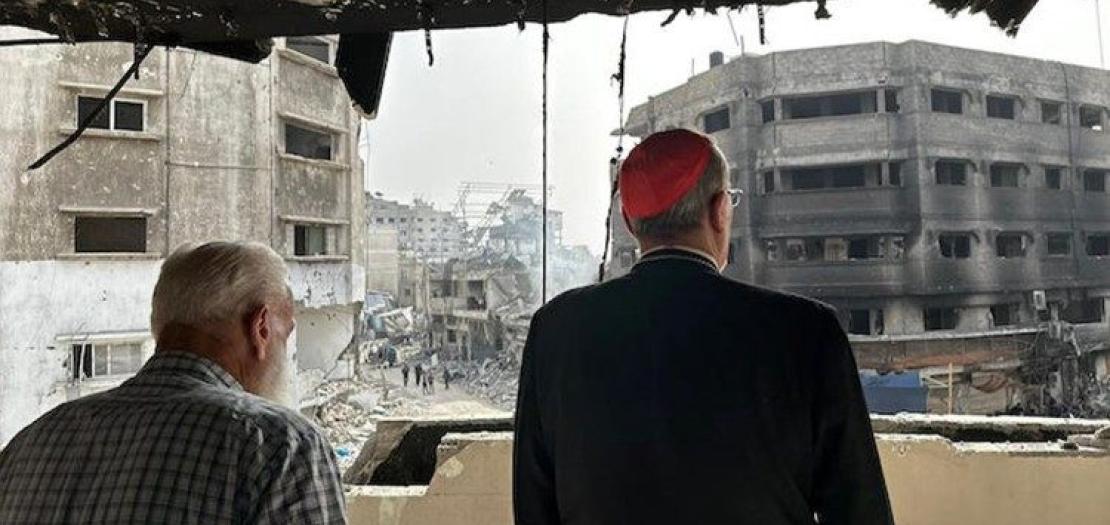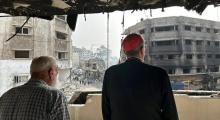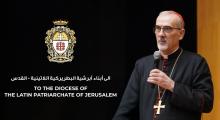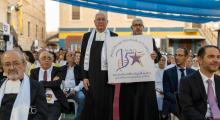Issued by the Catholic Center for Studies and Media - Jordan. Editor-in-chief Fr. Rif'at Bader - موقع أبونا abouna.org

File photo of Cardinal Piazzaballa during a visit to Gaza in June 2025
As news emerges of possible breakthroughs in negotiations to end two years of devastating conflict in Gaza, the Latin Patriarch of Jerusalem has issued a pastoral letter urging the faithful to nurture hope, remain steadfast in prayer, and reject the logic of violence and division.
In his message to the diocese, Cardinal Pierbattista Pizzaballa acknowledges the immense suffering caused by the war, while welcoming signs of progress toward a cessation of hostilities, the release of hostages, and the freeing of Palestinian prisoners.
“For the first time, the ews is reptig a possible new positive development: the release of Israeli hostages, of som Palestinian prisoners and the cessation of bombing and military offensives. This is an important and long-awaited first step,” he writes.
The Patriarch, however, cautions against unrealistic expectations, noting that “nothing is entirely clear or definite yet; many questions remain unanswered, and much still needs to be defined.”
A new beginning for everyone
The Patriarch expresses hope that this moment may bring relief to those who have endured unimaginable suffering.
“We rejoice above all for the end of hostilities, which we hope will not be temporary and will bring relief to the inhabitants of Gaza. We rejoice for all of us, because the possible end of this horrible war, which now seems very close, will finally mark a new beginning for everyone—not only Israelis and Palestinians, but also the whole world,” he says.
At the same time, he points to the “treacherous path” ahead, reminding the faithful that the end of military operations is only the “first—necessary and indispensable—step” toward lasting peace.
Ongoing suffering in the West Bank
The Patriarch draws attention to the deteriorating situation in the West Bank, where communities “now face all kinds of problems daily, especially in small villages, which are increasingly surrounded and suffocated by settler attacks, without sufficient protection from the security authorities.”
He underscores the daily uncertainty experienced by Christian communities, whose lives are shaped by the conflict’s “convoluted and painful dynamics,” affecting even routine decisions regarding safety, travel, and access to services.
A call to offer “a word of hope”
Cardinal Pizzaballa highlights the Church’s mission to provide spiritual guidance, rather than political commentary.
“We are not here to make a political statement or to provide a strategic analysis of events. The world is already full of such words, which rarely change the reality. Instead, we seek a spiritual vision that will help us remain steadfast in the Gospel,” he says.
The Patriarch reflects on the devastating impact of violence, not only on the land but on “the human soul of many, both in the Holy Land and around the world,” warning against the normalisation of suffering.
“Every life lost, every wound inflicted, every hunger endured remains a scandal in God’s eyes,” he affirms.
Fixing our eyes on Jesus
In the face of “the mystery of lawlessness” and the temptation to despair, the Patriarch urges the faithful to keep their gaze firmly fixed on Christ.
“Alone, we will not be able to understand this mystery. By our own strength, we will not be able to stand before the mystery of evil and resist it. That is why I feel an ever more urgent call to keep our eyes fixed on Jesus,” he writes, citing the Letter to the Hebrews (12:2).
The Patriarch recalls the tears of the past two years — of those who have lost loved ones, homes, and livelihoods — and reiterates that the Church’s response must be rooted in love and forgiveness, not revenge.
“Jesus, our teacher and Lord, made love that becomes gift and forgiveness His life’s choice. His wounds are not an incitement to revenge, but a sign of the ability to suffer out of love,” he states.







